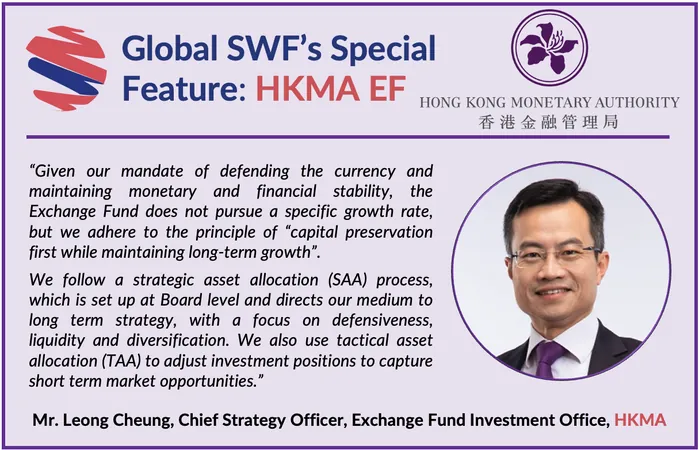
Hong Kong Monetary Authority: A Pillar of Financial Stability and Global Investment
2025-03-31
Author: Jessica Wong
Introduction
The Hong Kong Monetary Authority (HKMA), established in 1993 through the merger of the Commissioner of Banking and the Exchange Fund, plays a crucial role in maintaining the stability of Hong Kong's financial system. With current reserves amounting to approximately half a trillion USD, HKMA is not only among the world's largest central bank reserves but also a significant asset owner on the global stage.
Exchange Fund Structure
The Exchange Fund is divided into two primary portfolios: the Backing Portfolio and the Investment Portfolio. The Backing Portfolio ensures that the monetary base is fully equipped with high-quality, liquid assets, which constitutes about 50% of the Exchange Fund. Meanwhile, the Investment Portfolio is dedicated to diversifying investments across debt and equity markets while placing a strong emphasis on private equity and real estate through the Long-Term Growth Portfolio. Impressively, the Long-Term Growth Portfolio has delivered an annualized return of 11.5% since its inception in 2009.
Global Investments
HKMA's investment strategy has seen it engage in significant global real estate deals, purchasing office towers in major cities such as San Francisco, New York, London, and Sydney. In 2024, it also signed a Memorandum of Understanding with Saudi Arabia’s Public Investment Fund (PIF) to establish a new investment fund with a target size of $1 billion.
Expansion of Investment Capacity
In 2016, HKMA expanded its investment capacity with an influx of $28 billion from the Land Fund to create the Future Fund, aimed at generating higher returns over a decade. Following a successful initial period, the investment term was extended further into 2027. Moreover, the Hong Kong Investment Corporation (HKIC) was formed in 2021 to focus on specific funds including the Greater Bay Area Investment Fund and the Strategic Tech Fund, with HKMA playing a vital role in its formative stages.
Resilience During Financial Crises
In a recent interview, Mr. Leong Cheung, Chief Strategy Officer at the Exchange Fund Investment Office, highlighted the importance of HKMA in weathering financial crises, including the Asian Financial Crisis, the Global Financial Crisis, and the Covid-19 pandemic. He noted that HKMA's responsibilities extend beyond monetary stability, as it aims to reassure international investors of Hong Kong's resilience as a financial hub.
Future Growth and Strategic Focus
Regarding the future growth of the Exchange Fund, Mr. Cheung reiterated HKMA's commitment to capital preservation while focusing on long-term growth, guided by a strategic asset allocation process. Currently, 82% of the fund's assets are denominated in US dollars, with a small percentage in Hong Kong dollars and other currencies, reflecting a predominant international investment stance.
Global Collaboration and Sustainability
HKMA has consistently engaged with other central banks globally, sharing knowledge on pressing issues such as digitalization and market trends. This collaboration is essential, especially given the current geopolitical uncertainties and technological advancements that demand responsive financial strategies.
Sustainability Initiatives
Sustainability is also a significant focus for HKMA. As a signatory of the UN Principles for Responsible Investment since 2019, it has committed to a net-zero target by 2050, ensuring that a portion of the Investment Portfolio aligns with sustainable practices. Notably, HKMA has achieved a 46% reduction in carbon emissions within its public equities portfolio since 2017.
Organizational Growth and International Presence
The Exchange Fund Investment Office's workforce has grown modestly to around 150, and the HKMA continues to maintain its international presence with offices in New York, focusing on currency and bond market developments.
Role in Greater Bay Area
Finally, as Hong Kong plays a critical role in the Greater Bay area's economic integration, HKMA is at the forefront of facilitating financial infrastructure improvements that enhance cross-border investment. Initiatives like Bond Connect and Stock Connect support this integration, underscoring Hong Kong's strategic importance in the region and its aspiration to be a leading offshore RMB center.
Conclusion
In conclusion, the HKMA not only safeguards Hong Kong’s financial stability but also champions growth and sustainability in a rapidly changing global landscape. As it navigates the challenges and opportunities ahead, the steps taken today will shape the future of finance for Hong Kong and beyond.


 Brasil (PT)
Brasil (PT)
 Canada (EN)
Canada (EN)
 Chile (ES)
Chile (ES)
 Česko (CS)
Česko (CS)
 대한민국 (KO)
대한민국 (KO)
 España (ES)
España (ES)
 France (FR)
France (FR)
 Hong Kong (EN)
Hong Kong (EN)
 Italia (IT)
Italia (IT)
 日本 (JA)
日本 (JA)
 Magyarország (HU)
Magyarország (HU)
 Norge (NO)
Norge (NO)
 Polska (PL)
Polska (PL)
 Schweiz (DE)
Schweiz (DE)
 Singapore (EN)
Singapore (EN)
 Sverige (SV)
Sverige (SV)
 Suomi (FI)
Suomi (FI)
 Türkiye (TR)
Türkiye (TR)
 الإمارات العربية المتحدة (AR)
الإمارات العربية المتحدة (AR)